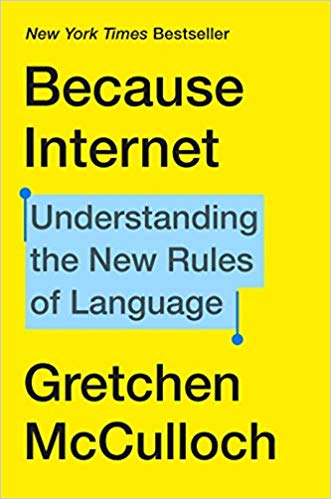Because Internet: Understanding the New Rules of Language
January 26, 2020 3:40 PM - by CTPrint - Subscribe
Kirkus: “The internet and mobile devices have brought us an explosion of writing by normal people,” writes [Gretchen] McCulloch, a Wired columnist and co-creator of the linguistics-focused podcast Lingthusiasm. In this provocative debut, the author celebrates the internet’s “vast sea of unedited, unfiltered words,” which constitute “a new genre, informal writing.”"
"... In conversational prose, she traces the “hidden patterns of written internet language” and how they are changing the way we communicate. She argues that new acronyms (btw, omg, lol), visuals (emoji), animated loops (gifs), emoticons (^-^), and other innovations are making language more efficient and playful. In its “purest form,” this new “public, informal, unselfconscious language” can be found in chat rooms. McCulloch’s wide-ranging text covers the history (so far) of internet culture, the sociology of users, and the diverse ways in which the internet has shaped our daily online social life. ...She also salutes unsung heroes of online language innovation: the Canadian Wayne Pearson, who probably coined “lol” in a 1980s chat room; the Japanese, who first used the pile of feces and other emojis; and biologist Richards Dawkins, who in 1976 coined the word “meme.”"
"... In conversational prose, she traces the “hidden patterns of written internet language” and how they are changing the way we communicate. She argues that new acronyms (btw, omg, lol), visuals (emoji), animated loops (gifs), emoticons (^-^), and other innovations are making language more efficient and playful. In its “purest form,” this new “public, informal, unselfconscious language” can be found in chat rooms. McCulloch’s wide-ranging text covers the history (so far) of internet culture, the sociology of users, and the diverse ways in which the internet has shaped our daily online social life. ...She also salutes unsung heroes of online language innovation: the Canadian Wayne Pearson, who probably coined “lol” in a 1980s chat room; the Japanese, who first used the pile of feces and other emojis; and biologist Richards Dawkins, who in 1976 coined the word “meme.”"
It is an absolute shame that nobody else here has said anything about this (I only just found out there was a FanFare post because of the podcast, admittedly), but WOW what a fascinating read! I found myself having to limit myself to reading about a chapter at a time, because I would be gripped by a powerful compulsion to share all these FASCINATING THINGS with just ANYONE within reach. The part about how "…" is the Boomer equivalent to a line break to casually separate thoughts was, on its own, fully worth the price of admission (especially because it helps serve as a Rosetta stone to understand Dad Emails more fully).
posted by DoctorFedora at 8:30 PM on February 9, 2020 [3 favorites]
posted by DoctorFedora at 8:30 PM on February 9, 2020 [3 favorites]
I'm also an Old Internet Person!
Reading the book I realized that somehow I had forgotten about LOlcats. How are the mighty fallen!
posted by exceptinsects at 3:36 PM on February 14, 2020 [1 favorite]
Reading the book I realized that somehow I had forgotten about LOlcats. How are the mighty fallen!
posted by exceptinsects at 3:36 PM on February 14, 2020 [1 favorite]
You are not logged in, either login or create an account to post comments

- learning about the Unicode Consortium.
- thinking about third places and the internet. "You can't fit enough dissenters in your living room to make a revolution out of close ties alone: you need the larger, looser network of a third place."
- learning about Susan Kare, whose needlework experience was something she drew on when designing "most of the original Apple icons." (And I loved McCulloch's story about creating the "Behold the field" meme in needlework and discovering that expressing the aspiration to give fewer fucks runs up against "the reality that delicate stitchwork requires many fucks indeed.")
- our own Jessamyn, nailing the hand-holding required to get non-internet older folks comfortable with technology. Yup, yup, yup.
-Linguist llama!
- identifying the generation gap: "it's about whether you dismiss the expressive capacity of informal writing or whether you assume it."
I liked her relaxed writing style, and appreciated her pulling this overview together; it reads like a good general introduction. (Linguists, please weigh in--was there something you would have added? Does this book speak to linguists, or is it mostly for lay readers? Does she get it right?)
I'm curious about what kind of audience this book is finding. In my community, not everybody is online, and getting non-digital natives there is a tough sell until they really, really need something that they can only get done on the internet... it can be quite a process to get them up to speed with know-how when all they want is the result. They'd probably benefit from Because Internet, but they're probably not going to read this (meanwhile, my Very Online spawn rolled her eyes at the cover and said, "Oooooh, is it going to explain memes?"). So, in general, who's getting something out of this?
Anyway, pocket friends, what did you think of it?
posted by MonkeyToes at 3:32 PM on February 1, 2020 [1 favorite]